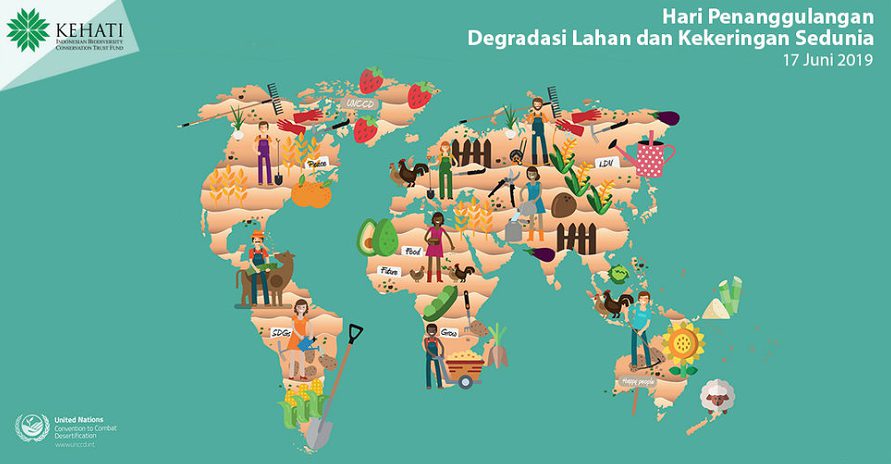WORLD DAY TO COMBAT DESERTIFICATION: REDUCING THE ENVIRONMENTAL DAMAGE FOR INDONESIA

-
Date:
30 Apr 2020 -
Author:
KEHATI
Every 17th of June, there is an important day known as World Day to Combat Desertification (WDCD). It unanimously adopted by the member countries of the United Nations at its General Assembly in 1994. (The resolution A/RES/49/115). One of the objectives of WDCD is to promote public awareness of the issue. The missions are to warn people that approximately, by 2025, 1.8 billion people will experience absolute water scarcity, and 2/3 of the world will be living under water-stressed conditions. By 2045, some 135 million people may be displaced as a result of desertification.
This commemoration also reminds us that restoring the soils of degraded ecosystems has the potential to store up to 3 billion tons of carbon annually. The slogan for 2019 is “Let’s grow the future together”. At this moment, Earth is the only planet known to support life, so it is important to build the future together to avoid damage to the earth. In Indonesia, the theme is so relevant because we have land degradation and drought that need to be addressed.
In general, land degradation occurred almost in every part of Indonesia, from Sumatera to Papua. The degraded land can be seen with very small productivity, heavy erosion, and land-cover less than 50%. In Indonesia, land degradation caused by many things, for example, population growth, poverty, natural disaster, unsuitable land usage and management, uncontrollable chemical uses, and also the ex-mining reclamation and rehabilitation that is not in accordance with the rules.
The Indonesian Government, in this case, is the Ministry of Environment and Forestry (KLHK) has its own concern about degraded-land management. In 2018, there are 14,01 million hectares degraded-land in Indonesia, Therefore, KLHK has a target to rehabilitate 207.000 ha of the forest and land in 2019, with the focus of 15 priority watersheds, 15 priority lakes, and 65 dams and also disaster-prone areas.
Yayasan KEHATI is actively participating in the effort of degraded-land management and drought prevention. There were activities that have been done and still ongoing. Restoration action in Sumatera, Java, Kalimantan, West Nusa were done with planting the plan that is suitable for the local ecosystem characteristic. Not only in the land, but Yayasan KEHATI also did some coral reef and mangrove rehabilitation. Yayasan KEHATI believes that there is a strong relationship between the environmental healths from the mountain to the sea.
Yayasan KEHATI developed the environmentally-friendly farming that minimizing the usage of chemicals. It also promotes local plants such as sago and sorghum in the eastern part of Indonesia. Yayasan KEHATI supports the diverse cropping patterns to create an ecological balance in those areas.
The community involvement is a keyword in degraded-land and drought prevention because they are the ones who get affected by land degradation. Therefore, Yayasan KEHATI always pushes community involvement in every activity.
